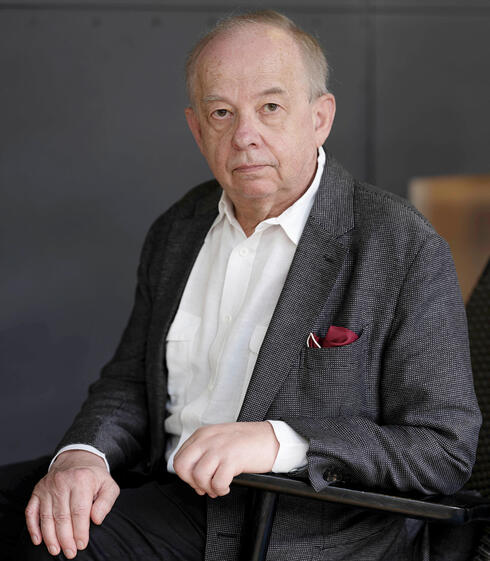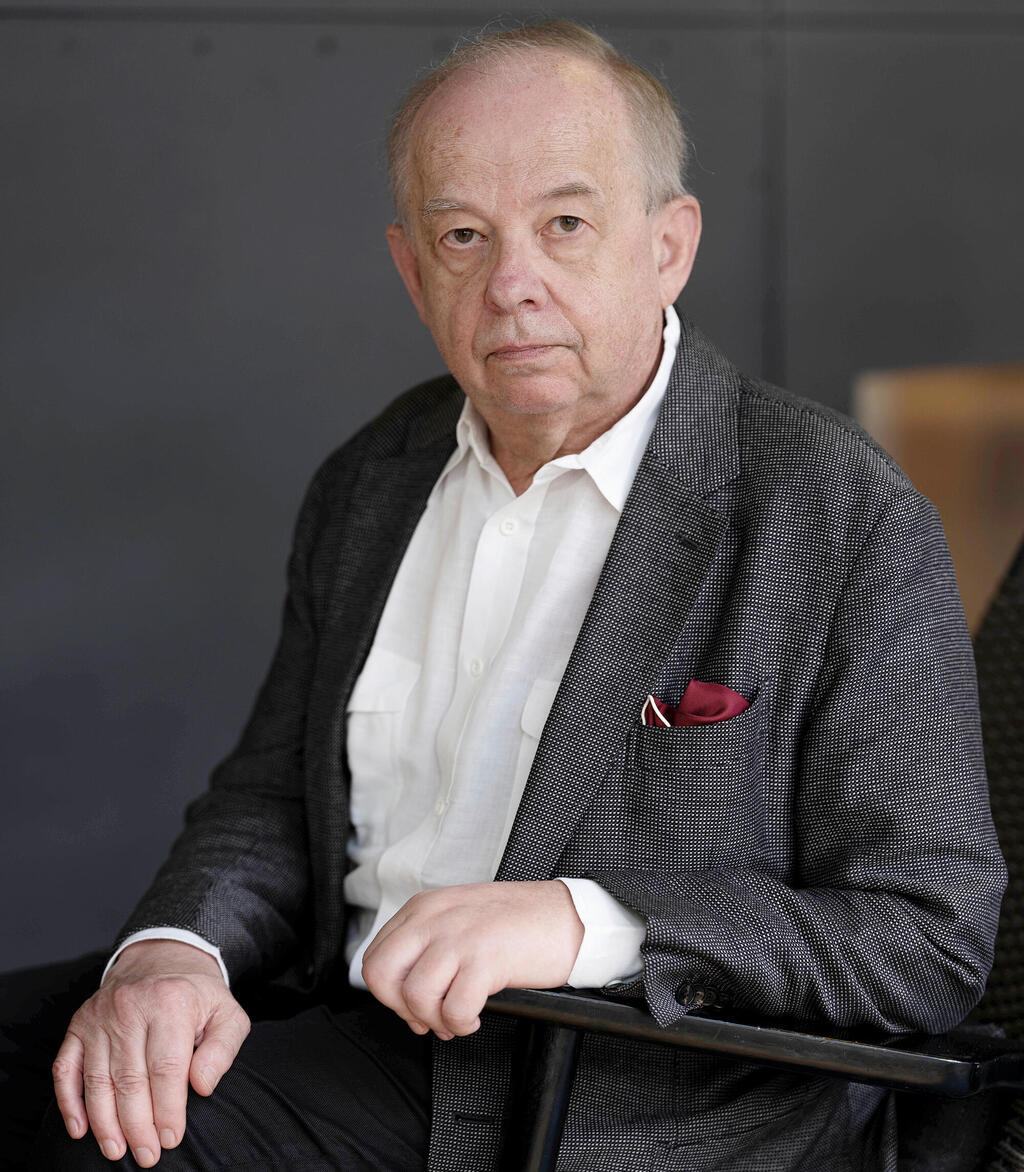
Wojciech Sadurski: "In Hungary and Poland one of the first steps of authoritarian populism was to control the appointment of judges"
The Polish professor is one of the world's leading experts on democratic erosion and spoke to Calcalist about similarities between Israel and Poland
"Yariv Levin, this is not Poland!" This was how Polish professor Wojciech Sadurski chose to open his speech to protesters against the judicial coup in Herzliya this week, amidst Prime Minister Benjamin Netanyahu's threats to unilaterally enforce the "mandate we received from the people.” Sadurski, an expert on populism and democratic erosion, was invited to speak at the annual conference of the Rubinstein Center for Constitutional Challenges at Reichman University. His research mainly focuses on the collapse of democracy in Poland. Jarosław and Lech Kaczyński founded the Law and Justice Party (PiS) in 2001 which has ruled Poland since 2015 and passed reforms that gave it complete control over all government institutions, the media and especially the courts. In the last year, Jarosław has not held an official government position, but as the leader of the party he is considered the de facto leader of Poland (Lech died in 2010).
Sadurski was born in Warsaw, now lives in Australia and teaches at the University of Sydney, the University of Warsaw, and Yale University. He is one of the most prominent critics of the regime in Poland, and was sued in the past by PiS for calling it a ‘criminal organization,’ and was sued again by the state television for calling it a ‘Gobbelsian.’ Sadorsky won both cases.
Will Israel end up like Hungary and Poland?
"The similarities are clear: in Hungary and Poland one of the first steps of authoritarian populism was to control the appointment of judges. In Hungary this was done through a new constitution, but in Poland the populists did not have the necessary majority to amend the constitution. Instead, they reorganized the National Council for the Judiciary, the equivalent of the committee for the selection of judges, where the ruling party had a majority. They saw that judges who sit on the council are chosen by the parliament and not by judges. Most importantly, the selection of judges for the council was changed so that the president and the ruling party controlled it.”
How is Israel different from Poland and Hungary?
"The differences are complex. First, Poland and Hungary are members of the European Union and the European Convention on Human Rights, by virtue of their membership in the Council of Europe. This imposes significant restrictions on the government's power to act. They are subject to both the European Court of Justice and the European Court of Human Rights. These restrictions include financial sanctions that can be imposed on financial entities. Israel, on the other hand, is not limited by external factors to the same extent.”
Doesn't Israel have a strong democratic tradition?
"Both Hungary and Poland have a democratic tradition. During communism, for example, they had very strong resistance movements, democratic and liberal. The Catholic Church also supported democratic dissidents. And right after the Polish Round Table Agreement in 1989, Poland adopted a very good liberal constitution. Secondly, Israel does not have a rigid constitution, in contrast to Poland and Hungary, which have a rigid constitution that imposes restrictions, so at least they must pretend to obey it. Israel's basic laws are a much weaker restriction.
“Third, in Poland there is a much more significant institutional system of checks and balances than in Israel, where the executive branch is part of the legislative branch. In Poland there is a strong president with real powers, including the right to veto legislation, two houses of parliament (which sometimes have tension between them, and one of them has the authority to suspend legislation), and a state auditor (a human rights representative with many powers, including the authority to petition against laws). The auditor is independent and he is elected by consensus between the coalition and the opposition, so it is difficult to take over this position. There is also a branched court system, including administrative courts that have not yet been taken over. Therefore, in Poland, from an institutional point of view, it is more complex to implement the will of the government than in Israel."
Are you less optimistic about the survival of Israeli democracy?
"I am generally optimistic about Israel for two reasons: one is Israeli society - the demonstrations affected the political behavior of the president, the prime minister and the government. This cannot be compared to the protests that happened in Poland and Hungary. The scale of participation and the duration of the struggle are unusual on a global level. The second reason is in Poland, the attack was comprehensive. I know that in Israel there is also an attempt to take over the media and civil society, but separate from the reform. In Poland the attack on institutions was much broader and comprehensive and included not only the courts, but also the election commission, the media, the public service, the attorney general, civil society, the army and more. They tried to subordinate everyone to the will of the ruling party."
In Israel there are several motivations for the judicial coup: Bezalel Smotrich and Simcha Rothman want a halachic state, and Netanyahu and Yariv Levin want to take revenge against the judicial system and destroy it. What was the main motivation in Poland to take over the system?
"There is a certain similarity between the motivations. I have heard from Israelis about the ‘second Israel’ - Mizrahim - who felt deprived by the ‘first Israel’ - the Ashkenazi elite that controlled the centers of power. I’m putting the Palestinian issue aside for a moment, although for me it is the most important. In Poland there is a certain similarity in the sense that Kaczyński represents the 'second Poland' - those who felt left behind and did not get to enjoy all the benefits of the fall of communism and the transition to democracy, were economically neglected, excluded from the elitist institutions, and did not have as much status. Kaczynski referred to this and called for a redistribution of power, a kind of new distributive justice. He believes that he must give added value to the disenchanted. Kaczynski himself feels that the intellectual elite never considered him or took him seriously."
Are there similarities between Netanyahu and Kaczynski?
"Both are very politically astute, but at least with Kaczynski it's the politics of tricks and deals, not policies and statesmanship. He's not in the league of statesmen like Charles de Gaulle or Konrad Adenauer. He works behind the scenes using politics to divide his supporters from his opponents, and in this he is very smart. He has no vision for the common good, but at most for nationalism."
Does the fact that you won the state’s lawsuits against you not prove that the judicial system is still independent?
"There are 10,000 judges in Poland. It is a large system and it is difficult to control all of it. In the Constitutional Court, which is controlled by the party, there are 15 judges. We have a judicial system that is completely different from that of Israel. There are judges that were appointed before the establishment of the current government, mainly in the lower courts, who oppose the actions of the government. The government has mainly taken over the higher courts, and is trying to appoint judges to the lower courts as well.
“There are more and more judges who cannot be trusted to implement justice. Some of the higher courts are no longer independent. When you go to trial, you don't know if your judge is independent or not. This is a severe blow to the rule of law. If you have a judge who was appointed before the establishment of the current government, there is a chance that you will receive a fair trial, because in general the judges are honest people. But if you are unlucky, and you got a judge appointed by the current government, you are in trouble."
You have another academic position in Poland. Is higher education still free?
"There is pressure at the systemic level against gender studies and feminism, and in favor of everything related to religious studies, which are given priority. Recently there was a campaign by the Minister of Education who expressed dissatisfaction with certain historians of the Holocaust. This is a very serious issue because they are also investigating Poland's involvement in World War Two, and now they are receiving threats to cut budgets, which means they won't be able to continue investigating. So there is a growing ideological and political attack against higher education. But in the meantime, Polish education is still free."
Is the attack on liberal democracy reversible? What are its chances of winning?
"I am an optimist. I believe that authoritarian populism can be defeated, both in the streets and in elections. Look at the world. There are cases when populists lost: Janez Janša in Slovenia, Andrej Babiš in the Czech Republic, Jair Bolsonaro in Brazil and Rodrigo Duterte in the Philippines. So, they can be defeated in the elections.
"The main question is whether the rulers manage to change the system so that they perpetuate their rule. Therefore, from a populist point of view, Viktor Orbán, who also managed to make a systemic change in the Hungarian constitutional order, is a success story for the populists and a sad story for the democrats. But it doesn't have to be that way. Poland has elections in October, and these will be dramatic elections for democracy. There is an active opposition, but unfortunately it is divided. If the current government wins, it will be its third term and then I will be very pessimistic about the future of democracy."














